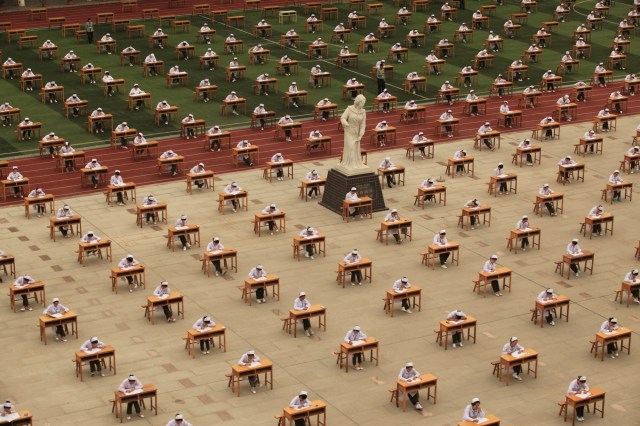Studentsl take part in graduation examinations in Shaanxi, China. Credit: VCG / VCG via Getty

When people talk about globalisation, what they usually mean is westernisation – the culture, technology and values of the West going global.
There is, of course, a lot said about the rise of export-led Asian economies, especially China, but notice the framing of the issue. Despite the huge impact of Chinese industrial prowess on the global economy, western media narratives relegate the country to a supporting role in a drama that is still all about us: cheap Chinese exports servicing western consumer culture; Chinese capital flows feeding the West’s appetite for debt; the offshoring of manufacturing capacity as a business strategy for western companies.
Meanwhile, we arrogantly assume that the process of globalisation-as-westernisation (i.e. the rest of the world becoming more like us) will carry on regardless. The idea that China might be able to exert ‘soft power’ influence in the other direction doesn’t much enter into our minds.
Here are three unrelated stories that should give us pause for thought:
The first starts with Ariana Grande, an American pop star so famous that even I’ve heard of her. When, earlier this month, she released her new single, it was expected it would go straight to the top of the charts – including the iTunes chart for digital downloads. But as Adam Minter explains for Bloomberg, that’s not how things worked out:
“Kris Wu, a superstar in China, not only had the No. 1 spot on the iTunes’ singles chart but also seven of the top 10 songs. It was an extraordinary achievement for an artist with almost no North American profile”
How, then, did he did he pull off this chart upset? There were allegations of hi-tech malarkey, but the explanation appears to be that Wu’s new album was released in America before China – and that his devoted Chinese fans found a way of downloading it from US websites. The episode is an illustration of the way that digital is creating a global media market place in which western tastes, and taste-makers, are no longer the be-all-and-end-all.
Now, onto a different kind of chart: The Economist reports on the growing achievements of Chinese universities in STEM subjects. The article includes a list of world universities ranked by the number of highly cited papers they’ve produced in maths and computing. China’s Tsinghua University comes in at number one – and of the top 15 universities, seven are in China (including one in Hong Kong), six are in America and two in Singapore. Europe doesn’t feature at all.
Finally, a particular application of China’s STEM expertise: surveillance. Previously on UnHerd, I’ve written about the Chinese state’s advanced deployment of facial recognition technology and its all-encompassing Social Credit System. I also argued that such systems would be exported to, or emulated by, other countries.
Well, here’s a Reuters special report by Angus Berwick on Chinese involvement in Venezuela’s ‘ Fatherland Card’ – a smartcard ID system that “transmits data about cardholders to computer servers. The card is increasingly linked by the government to subsidized food, health and other social programs most Venezuelans rely on to survive.”
One could also mention Singapore’s “Lamppost-as-a-Platform” project which is looking to install CCTV on the city-state’s 110,000 lampposts. Here, by Aradhana Aravindan and John Geddie, is another Reuters report on the story:
“Video surveillance networks are common in cities like London or New York. But Ian Wilson, a security lecturer at Australia’s Murdoch University said he believed that Singapore’s would be different in that it might involve extensive facial recognition technology.
“Such technology has become commonplace in Chinese cities like Beijing and Shanghai.”
Cities around the world could soon be looking like Beijing and Shanghai – looking right at you, in fact.
It’s not that the age of westernisation is over, but that it’s no longer the only force in globalisation – and nor does it have any right to be. For both better and worse, China, and other rising powers, will be shaping the way we live and not just in the economic sphere.
So, one more reason to lift our heads from our immediate news fixations and take in the world around us.










Join the discussion
Join like minded readers that support our journalism by becoming a paid subscriber
To join the discussion in the comments, become a paid subscriber.
Join like minded readers that support our journalism, read unlimited articles and enjoy other subscriber-only benefits.
Subscribe